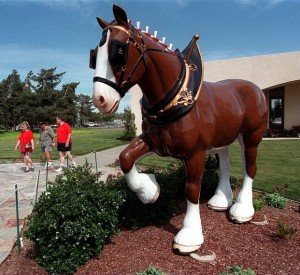Is the era of the Big Boys buying up the Small Guys finally upon us? So it seems.
In 2011, the craft beer world was rocked by news that Anheuser-Busch would buy pioneering Chicago brewery Goose Island. The aftershocks continue to this day – check out any decent beer-oriented discussion group and you will still see hot debates over whether it is moral or ethical to drink Goose Island now that it is wholly owned by what microbrew aficionados derisively call a “macro” brewer.
Lagunitas founder Tony Magee made his disapproval of this sort of thing absolutely plain.
“There’s no plan to sell the business at any point … a few months ago, the largest brewer in the world came here to talk about what our intentions might be,” he told me last spring. “I said, no, there is not much to talk about here … This is my life’s work. Why would I want to turn it into cash? I mean, you don’t raise kids to sell ‘em. You raise kids to send them off into the world and continue to explore the future for you. That’s what Lagunitas is going to do.”
Then last year, the beer world experienced a shiver when Kansas City-based Boulevard Brewing would sell to Duvel Moortgat. But instead of melting down, the brewing community reacted with resignation, or even modest approval.
“I think that’s something Vinnie and I would definitely take very seriously down the road,” Russian River co-owner Natalie Cilurzo told me earlier this year. “If we were to sell our brewery 20 years down the road, we would sell it to the right person. We wouldn’t just sell it to the highest bidder. We’re not in it for the money.”
Just this week, meanwhile, Anheuser-Busch announced it would buy Blue Point Brewing, Long Island’s oldest brewer, #36 on the Brewers Association list of top American craft breweries by volume, only slightly smaller than Sonoma County’s Bear Republic, which came in #34. Unlike the 2011 Goose Island explosion, the reaction to this news has been relatively modest. New York-based beer site Beer Union explored the question.
“And the sky is not falling,” the site concluded. “Acquisitions of breweries by larger corporations is simply part of the world they live in. They understand that there are people behind these companies with lives, like any other business owner. They know that the growth of craft beer, something they work so hard to promote, means that some brewers will be bought.”
This sort of adjustment is probably inevitable. Big beer companies are seeing their sales stagnate and market share erode with flagships like Budweiser and Coors Light. They are turning increasingly to craft-style beers, like Blue Moon, a product of Coors, so it makes sense that they might buy ready-made craft outfits like Goose Island rather than try to reinvent the craft wheel.
At the same time, the iconic breweries of the craft beer world, particularly the standout survivors of the boom of the 1990s, are headed by brewers now in middle age or even at retirement age. At least some of that generation of brewers might well see a value in seeing their work continue under the wing of a larger brewer – if not Bud and Coors, then perhaps a smaller outfit like Duvel.
Even hard core beer drinkers seem to be increasingly amenable to this sort of thing. “If they permit the breweries to operate somewhat autonomously these acquisitions may not be a bad thing,” one Beer Advocate commenter said this morning. “So far it seems that Goose Island is doing OK.”
Seems like we’re finally used to seeing the future.
– Sean Scully


 buyer at Fircrest Market in Sebastopol and the administrator of the NorCal Beer Geeks group on Facebook.
buyer at Fircrest Market in Sebastopol and the administrator of the NorCal Beer Geeks group on Facebook.